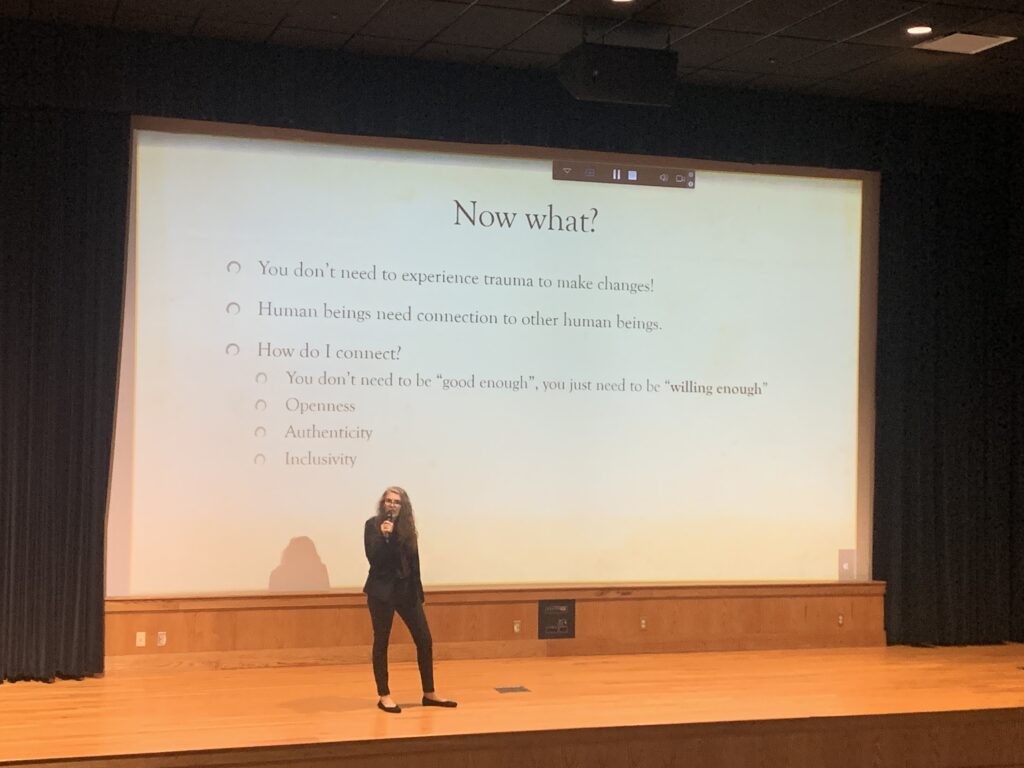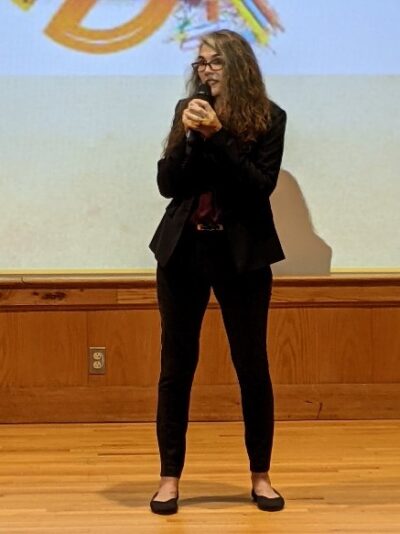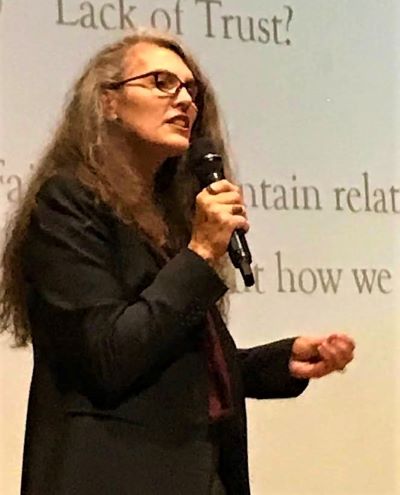The story co-written with Chloe Ettinger
Relationships are what make us human. That’s what Dr. Candy Noltensmeyer, 2021 student nominated faculty of the year award winner, said during the “Last Lecture” presentation on Thursday, Nov. 18.
Noltensmeyer is an associate professor at Western Carolina University in the Communications Department. Her research focuses on forms of communication in dynamic cultural competence, stigma, bias and sexuality.
The director of community engagement for WCU’s Student Government Association, Estefany Gordillo-Rivas, said that the annual “Last Lecture” event that goes along with the award started at Carnegie Mellon University with one of their professors Randy Pausch. The “Last Lecture” was then adopted by many universities across the country.
“I think relationships are probably one of the foundational aspects of our lives and very often one that we don’t spend very much time talking about or valuing,” Noltensmeyer said.

The need to maintain relationships and connections is just as important because relationships are connected to humans’ overall health, she said.
“Failure to maintain a relationship can seriously impact our health and right now, our health is pretty darn important, it is at risk everywhere we go,” Noltensmeyer said.
However, one of the biggest culprits for this failure to maintain relationships can stem from many factors. Some of the factors Noltensmeyer discussed were the overconsumption of social media, isolation due to the pandemic and lack of trust from others and oneself.
Noltensmeyer believes that the foundation of forming, maintaining and trusting relationships is from being vulnerable and open. In the spirit of being vulnerable, she told a personal traumatic story that has transformed her in many ways.
When Noltensmeyer was 17, she passed out in the shower due to an unknown reason and was burned on 65% of her body from hot water. It was early in the morning, and no one was awake but her. When her parents and brothers found her, she had second and third-degree burns to most of her arms and legs. This experience has permanently scarred her, and she believes that she is still recovering from this experience 28 years later.

The reason why Noltensmeyer told her story was not to make the audience feel sorry for her experience but to show openness and vulnerability. Her vulnerability helped explain that every experience, even the painful ones, makes us who we are.
“When we make ourselves just a bit vulnerable, guess what? Other people are much more willing to show their vulnerabilities too,” Noltensmeyer said.
“What we find out is that we are often more alike than we are different. You may not have had the traumatic experiences that I have had, but I bet you have had some pretty awful experiences of your own in your own lives. And some of it is hurtful, and sometimes other people just don’t get it. Don’t get how this hurt impacted you. Because they may have experienced the same thing but in fact experienced it differently. They may have had a different reaction. And this is hard, this is really hard. But when we open up, when we are vulnerable, we’re more likely to give others the benefit of the doubt. Were more likely to be willing to see their perspective.”
Being vulnerable is not an easy task. Vulnerability consists of putting yourself out there which may be uncomfortable but may lead to making new relationships. However, fear of judgment can make humans scared to be vulnerable, she said.
“We’re scared to be vulnerable,” Noltensmeyer said. “We’re scared to put ourselves out there. We’re scared that people won’t see our experiences. But the fact of the matter is, human beings need connection to other human beings. This is a scientific fact.”
Being vulnerable is not the only form of connection needed to make relationships last. Being your authentic self is also necessary for relationships, she said.
“Part of being open is about being authentic,” Noltensmeyer said. “It is showing up as we are. This is me. Sometimes I’m a hot mess, but I still show up. Sometimes I say the wrong words or say them in the wrong order, but I am here.”

Humans’ authentic self is flawed. Everyone has unique attributes that make them, them. However, those flaws should not be viewed negatively but as beautiful, she said.
“So much of the time it’s fear that stops us from connecting,” Noltensmeyer said. “So much of the time it is the what if’s, the doubt, right? Will I be good enough? We get in our own way frankly, and we really need to get out of our way, we need to push forward.”
People are constantly growing and evolving based on experiences, life decisions, education, new relationships and it causes human minds to change over time. That is because humans are not static creatures. They are constantly changing, she said.
Another talking topic point that tied communication, vulnerability and openness together was her belief in inclusivity. Noltensmeyer believes that inclusivity is one of the most valuable things people can do for others. She even commends WCU for valuing inclusivity within the campus community.
“It’s not just about skin color. It’s not just about gender. It’s not just about our ability. It’s not just about these markers we talk so much about. Inclusivity means regardless of what you look like or how you show up in front of me, I value you. That’s what inclusivity means,” she said.
Connections, openness, vulnerability and inclusivity are valuable to forming and maintaining relationships. Taking the time to focus on these moments in life will be beneficial for people’s health and overall wellbeing. However, it is within yourself to make that decision, she said.
“You don’t need to be good enough to connect, you just need to be willing enough,” Noltensmeyer said.
One of the most important things to Noltensmeyer is making sure the content in her classes is easy to understand for everyone no matter their background, and that her classes are a safe space for all.
“No matter what I’m teaching and how I’m teaching, I’m always thinking about you guys,” Noltensmeyer said referring to her students in an interview. “I’m thinking about how are you going to understand this? What do you need to know? What are the biggest problems in life, in terms of orientation to our field, and what I have to give you? How can I best prepare you for the world?”
Noltensmeyer has done an incredible job connecting to her students on an emotional level. Madelyn Ricket, a senior communications major at WCU loves that Noltensmeyer not only cares about their academic success, but also their mental health.
“I love that woman so much. I think she is just a wonderful lady. She really cares about her students and tries to make her content understandable for everyone. She really cares about her students’ wellbeing,” Ricket said.
Noltensmeyer said it is an honor to be receiving the award and to be recognized, especially since there is so many incredible professors on this campus. She also said she learns so much from all of her students just like how they learn from her.
“My message is getting better and better every year, every semester, because of who my students are. So, I am not who I am without my students,” Noltensmeyer said.
WCU SGA live steamed the event on their Facebook page. You can view the recording here.


